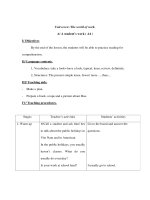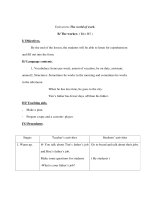date of planing sundaydecember 2 2007 date of planing thursdaynovember 12 2009 date of teaching thursdaynovember 26 2009 period 41 unit 67 the world of work lesson 1 a1 thùc hµnh vò c©u so s¸nh
Bạn đang xem bản rút gọn của tài liệu. Xem và tải ngay bản đầy đủ của tài liệu tại đây (97.32 KB, 13 trang )
<span class='text_page_counter'>(1)</span><div class='page_container' data-page=1>
Date of planing: Thursday,November 12, 2009
Date of teaching: Thursday,November 26, 2009
<b> Period 41: Unit 67: The world of work</b>
<i><b> Lesson 1 : A1- Thực hành về câu so sánh hơn kém</b></i>
<b>A. Aims and requests:</b>
I. Aims: Practicing comparatives with “fewer/ more” to talk about a student’s
work.
II. Requests: By the end of the lesson, Ss will be able to develop their speaking
skill by practicing comparatives with “fewer/ more” to talk about a student’s
work.
III. Teacher’s preparations: Word cues, posters.
B. Procedures.
Teacher’ activities Time Students’ activities
I. Organization: - Good morning!
- Who’s absent today?
II. Checking up previous lesson.
1. Write the new words.
2. Call 3 Ss to do on the board.
3. Remark, correct and give marks.
III. New lesson.
1. Introduction: Today, you’ll practicing
comparatives with “fewer/ more” to talk
about a student’s work.
2. Presentation
a. Vocabulary
- T elicits the new words.
- Modal- have Ss repeat chorally and read
individually.
- an hour: tiÕng ( translation)
- (to) last: kết thúc( situation)
- hard: vất vả, chăm chỉ
- late- later: mn- mn h¬n
- early- earlier: sím, sím h¬n
- few- fewer: Ýt, Ýt h¬n
- many- more: nhiỊu, nhiỊu h¬n
b. Pre- questions prediction (Questions-
P.73)
- Have Ss answer the questions.
- Get feedback and correct.
b. Presentation text (A1- P.73)
- Have Ss read the dialogue and give model
sentences.
- Have Ss repeat chorally then read
individually
- Have Ss give form and meaning.
* Model sentences:
- My classes start earlier than Hoa’s classes.
- I work more than Hoa.
* Form:
- S1 + am/ is/ are + short- adj + er + than +
S2.
3. Practice: Word cue Drill.
- Show the cues.
- Modal the sentences.
- Have Ss repeat chorally then read in pairs.
- Have Ss work in pairs to practise the cues.
1
5
1
6
5
5
9
- Good morning!
- Monitor answers:…
- Write the new words.
- Listen
- Give the words.
- Repeat chorally
- Read individually
- Give the meaning
- Copy
- Read the questions answer
- Give the answers.
a. Hoa’s classes start at 7 o’clock.
b. They finish at a quarter past
eleven.
c. Hoa does her homework 2 hours
a day.
e. I work more hours than Hoa.
- Ss read the dialogue and give
model sentences.
- Ss repeat chorally.
- Read individually
- Ss give form and meaning.
- Take note.
- Look at the cues.
</div>
<span class='text_page_counter'>(2)</span><div class='page_container' data-page=2>
- Call some pairs of Ss to practise.
- Correct Ss’ mistakes.
Hoa’s classes:
7.00
Our classes:
7.15
<b>Start</b>
Hoa: 2 hours
Miss Lan: 4
hours
<b>Work</b>
Lesson1: 2
activities.
Lesson2: 3
activieties
<b>Have</b>
4. Further practice: Noughts and crosses
- Elicit- model- have ss repeat chorally.
- Have Ss practise making comparatives to
get marks for their team.
- Correct Ss’ mistakes.
Classes/
start Our school year/ start Summer vacation/
finish
Summer
vacation/
start
Work
(hours) Classes/ finish
Activities in
summer
vacation
School year/
finish Friends/ have
IV. Consolidation.
* Have Ss remind the uses abd form of
comparatives.
V. Homework.
- Learn the new words.
- Do exercises: B1
9
3
1
suggestions and responses.
- Practise orally
Ex: S1: Hoa’s classes start earlier
than our classes.
S2: Our classes start later than
Hoa’s classes.
- Correct each other.
- Work in teams to make
comparatives.
- Practise orally.
Ex: My classes start earlier than
Hoa’s classes.
- Ss remind the uses abd form of
comparatives.
- Copy the homework.
Date of planing: Friday,November 21, 2008
Date of teaching: Friday,November 28, 2008
<b> Period 42 Unit 7: The world of work</b>
<i><b> Lesson 2: A2, 3: Đọc hiểu và so sánh về kỳ nghỉ</b></i>
<i><b> cđa häc sinh MÜ vµ häc sinh ViÖt Nam. </b></i>
<b>A. Aims and requests: </b>
I. Aims: - Reading a text for details to compare American students’ vacation and
Vietnamese students’ vacation.
II. Requests: - By the end of the lesson, Ss will be able to develop their reading
skill to compare American students’ vacation and Vietnamese students’ vacation.
III. Teacher’s preparations: Posters.
<b>B. Procedures.</b>
Teacher’ activities Time Students’ activities
I. Organization: - Good morning!
- Who’s absent today?
II. Checking up previous lesson.
1. Write the new words.
- Make the comparatives.
1
5
- Good morning!
- Monitor answers: ….
- Write the new words and
read.
</div>
<span class='text_page_counter'>(3)</span><div class='page_container' data-page=3>
a. I/ go to school/ early/ Lan.
b. Van/ have/ many friends/ Tung.
2. Call 3 Ss to do on the board.
Have the class practise the dialogue in pairs.
3. Remark, correct and give marks.
III. New lesson.
1. Introduction: Today, you’ll read a text for
details to compare American students’ vacation
and Vietnamese students’ vacation.
2. Pre- reading
a. Vocabulary
- T elicits the new words.
- Modal- have Ss repeat chorally and read
individually.
- Easter: Lễ phục sinh ( translation)
- (to) celebrate: kỉ niệm ( situation)
- Thankgiving: lễ tạ ơn ( translation)
- New Year’s Ever (Day): đêm giao thừa
( situation)
- Independence Day: ngày quốc khánh
- Christmas: giáng sinh ( translation)
* check vocab: What and where
b. True/ False statements prediction.
Give 5 sentences and ask Ss to predict which
sentences are T or F.
- Get prediction from Ss.
- b1. Vietnamese students have fewer vacations
than American students.
- b2. American students have the longest vacation
in the winter.
- b3. They don’t have Tet holiday.
- b4. Their most important vacation is New Year’s
day.
- b5. They usually spend their time with their
families on Thanksgiving and Christmas.
3. While- reading.
a. Read and check
- Have Ss read the text then check their
predictions.
- Have Ss compare with the parners.
- Get feedback and correct Ss’ mistakes.
b. Grids:
- Have Ss read the text again and work in groups
to fill in the grids.
- Model the one.
Vacation Vietnamese
students American students
Longest vacation In the summer In the
summer
Tet holiday <sub></sub> <sub></sub>
Thanksgiving <sub></sub> <sub></sub>
Christmas <sub></sub> <sub></sub>
Independence
Day September 2
nd <sub>July 4</sub>th
Easter <sub></sub> <sub></sub>
New Year’s Ever
(Day) Lunar December 30th January 1st
1
6
4
8
7
- Make the comparatives.
a. I go to school earlier than
Lan.
b. Van has more friends than
Trung.
- Listen
- Give the words.
- Repeat chorally
- Read individually
- Give the meaning
- Copy
- Do: What and where
- Read all sentences
- Predict true sentences and
false sentences.
- Give the predictions.
Ex:
b1, T
- Read the text then check the
predictions.
- Compare with the parners.
- Give the correct answer
* Answer key:
b1. T ; b2. F ; b3. T ; b4. F ;
b5. T
</div>
<span class='text_page_counter'>(4)</span><div class='page_container' data-page=4>
- Get feedback and correct.
4. Post- Reading: A3- P.74: Listening.
- Have Ss look at the pictures in A3 and guess the
name name to the public holiday in each picture.
- Get prediction.
- Have Ss listen to the tape and write the name to
the public holiday in each picture.
- Get feedback.
* Answer key:
a. Thanksgiving
b. Independence Day
c. New Year’s Ever (Day)
d. Christmas
IV. Consolidation.
* Write about Vietnamese students’ vacation
using the grids
- Get feedback and correct.
V. Homework.
- Learn the new words.
- Do exercises: A2, 3
7
5
1
- Ss look at the pictures in A3
and guess the name name to
the public holiday in each
picture.
- Give prediction.
- Listen to the tape and write
the name to the public holiday
in each picture.
- Compare with the partners.
- Give the correct answer.
- Correct each other.
* Write about Vietnamese
students’ vacation using the
grids
Ex: We have the longest
vacation in the summer and we
have Tet holiday on Lunar
December 30th……<sub>..</sub>
- Copy the homework.
Date of planing: Friday,November 21, 2008
Date of teaching: Tuesday,December 2, 2008
<b> Period 43 Unit 7: The world of work</b>
<i><b> Lesson 3: A4: §äc hiĨu vỊ cc sèng cđa</b></i>
<i><b> mét häc sinh tiªu biĨu. </b></i>
<b>A. Aims and requests: </b>
I. Aims: - Reading a text for details about a typical student’s life.
II. Requests: - By the end of the lesson, Ss will be able to develop their reading
skill about a typical student’s life.
III. Teacher’s preparations: Posters.
<b>B. Procedures.</b>
</div>
<span class='text_page_counter'>(5)</span><div class='page_container' data-page=5>
I. Organization: - Good morning!
- Who’s absent today?
II. Checking up previous lesson.
1. Write the new words.
2. Call 3 Ss to do on the board.
Have the class practise the dialogue in pairs.
3. Remark, correct and give marks.
III. New lesson.
1. Introduction: Today, you’ll read a text for
details about a typical student’s life.
2. Pre- reading
a. Vocabulary
- T elicits the new words.
- Modal- have Ss repeat chorally and read
individually.
- period: tiÕt häc ( translation)
- (to) reveiw: «n tËp ( situation)
- typical (a): điển hình ( translation)
- keen: thích, đam mê ( situation)
- lazy (a): lêi ( antonym)
* check vocab: Rub out and Remember
b. Prediction.
Give 5 sentences and ask Ss to guess the
amount of time Hoa spends on her work.
- Get prediction from Ss.
- b1. Hoa goes to school………days a week.
- b2. She has……….periods a day.
- b3. She works……….hours a week.
- b4. She has about………hours of homework
every week.
- b5. Before tests she works……….hours a
week.
3. While- reading.
a. Read and check
- Have Ss read the text then check their
predictions.
- Have Ss compare with the parners.
- Get feedback and correct Ss’ mistakes.
b. Lucky Numbers (Questions A4- P.75):
- Have Ss read the questions and the text again
- Have Ss work in groups to answer the
questions.
- Get feedback and correct.
1. Why do some people think that students have
an easy life?
2. Lucky Number
3. Does Hoa have to work at home?
4. Does Hoa work fewer than most workers?
5. How many hours a week do you work?
6. Lucky Numbers.
7. How many hours a week does Hoa work
before tests?
8. Do you work fewer than Hoa?
4. Post- Reading: Questions- Answers (orally).
- Have Ss work in pairs to answer the questions.
a. What do you think of a student’s life?
b. Do you think Ss are lazy?
1
5
1
6
5
8
8
5
- Good morning!
- Monitor answers: ….
- Write the new words and
read.
- Listen
- Give the words.
- Repeat chorally
- Read individually
- Give the meaning
- Copy
- Do: Rub out and Remember
- Read all sentences
- Predict the amount of time
Hoa spends on her work.
- Give the predictions.
Ex:
b1, 6
- Read the text then check the
predictions.
- Compare with the parners.
- Give the correct answer
* Answer key:
b1. 6 ; b2. 5 ; b3. 20 ; b4.12;
b5. 45
- Ss read the questions and the
text again.
- Work in groups to answer the
questions.
- Give the answer.
1. Because they think students
only work a few hours a day
and they have long vacation.
3. Yes, she does.
4.No, she doesn’t.
5. Ss answer.
7. 45
8. Ss answer.
</div>
<span class='text_page_counter'>(6)</span><div class='page_container' data-page=6>
- Get prediction.
IV. Consolidation.
* Write about the amout of time you do on your
work.
- Get feedback and correct.
V. Homework.
- Learn the new words.
- Do exercises: A4, 5
5
1
- Practice orally.
- Correct each other.
* Write about the amout of
time they do on their work.
Ex: Many people think
students are lazy or not
hard-working. But it is not true.
Every day I study about…..at
school. After that, I go home
and…
- Copy the homework.
Date of planing: Friday,November 28, 2008
Date of teaching: Thursday,December 4, 2008
<b>Period 44: Test Delivery and correction</b>
<b>A. Aims and requests:</b>
I. Aims: - Correcting the test.
II. Requests: - By the end of the lesson, T will be able to help Ss correct the test
and Ss can find out what mistakes they do to selfcorrect.
III. Teacher’s preparations: Posters.
B. Procedures.
Teacher’ activities Students’ activities
I. Organization: - Good morning!
- Who’s absent today?
II. Checking up SS’ preparation.
III. New lesson.
<b>Answer key</b>
<b>A. Question 1:</b>
I. 0,5 marks for each correct one.
1. c
2. b
3. b
4. a
5. c
6. a
II. 0,5 marks for each correct one.
1. are studying
2. is…doing
3. watch
4. will have
III. 0,5 marks for each correct one.
1. b
2. d
3. a
4. c
IV. 0,5 marks for each correct one.
1. Tung and Binh are playing catch.
2. No, she isn’t.
3. Van is skipping rope.
4. Yes, they do.
V. 0,5 marks for each correct one.
1. We are studying Math in the class now.
- Goodmorning!
</div>
<span class='text_page_counter'>(7)</span><div class='page_container' data-page=7>
2. Let’s watch a movie.
<b>Question 2:</b>
I. 0,5 marks for each correct one.
1. b
2. a
3. a
4. c
5. c
6. b
II. 0,5 marks for each correct one.
1. are playing
2. is…doing
3. come
4. will take
III. 0,5 marks for each correct one.
1. c
2. a
3. d
4. b
IV. 0,5 marks for each correct one.
1. They are playing games.
2. No, he isn’t.
3. Trang is playing blindman’s bluff with her friends.
4. Yes, they do.
V. 0,5 marks for each correct one.
1. We are studying Math in the class now.
2. Let’s watch a movie.
<b>B. I. Spelling mistakes.</b>
1. playing not “phaying”
2. studying not “studing”
3. let’s not “lets’
4. coming not “comeing’
<b>II. Grammar mistakes.</b>
1. The present simple tense
a. We + V(inf) watch not “watching”
b. come not “coming”
2. The future simple tense
will have/ take not “having/ taking”
3. let’s = let us not “let is”
- Let’s watch a movie not “let’s watch see a movie”.
4. The present progressive tense.
a. We are studying math now not “ We are study…’
IV. Consolidation.
* Put the verbs in the correct form.
1. She (be)……..15 0n her next birthday.
2. They always (play)………soccer after school.
3. There (be)…….24 teachers in my school.
4. We (take)………the exam now.
V. Homework.
- Prepare unit 7.
- Correct the mistakes.
* Put the verbs in the
correct form.
1. will be
2. play
3. are
4. are taking
- Copy the homework.
Date of planing: Friday,November 28, 2008
Date of teaching: Friday,December 4, 2008
<b> Period 44 Unit 7: The world of work</b>
<i><b> Lesson 4: B1, 4: §äc vµ nghe vỊ nghỊ nghiƯp </b></i>
</div>
<span class='text_page_counter'>(8)</span><div class='page_container' data-page=8>
I. Aims: - Reading and listening for details about jobs.
II. Requests: - By the end of the lesson, Ss will be able to develop their reading
and listening skills about jobs.
III. Teacher’s preparations: Posters.
<b>B. Procedures.</b>
Teacher’ activities Time Students’ activities
I. Organization: - Good morning!
- Who’s absent today?
II. Checking up previous lesson.
1. Write the new words.
2. Call 3 Ss to do on the board.
3. Remark, correct and give marks.
III. New lesson.
1. Introduction: Today, you’ll read and listen for
details about jobs
2. Pre- reading
a. Vocabulary
- T elicits the new words.
- Modal- have Ss repeat chorally and read
individually.
- (to) take care of:trông nom, giữ gìn ( trans)
- (to) work part-time: làm thêm giờ ( situation)
- (to) play gold: chơi gôn ( visual)
- a mechanic: thợ máy ( situation)
- a machine: m¸y mãc ( visual)
- shift (n): ca lµm viƯc, bi häc ( translation)
- homeless (a): không nhà cửa ( situation)
* check vocab: Rub out and Remember
b. Ordering (for main ideas).
- Have Ss predict the order of the main ideas.
- Get prediction from Ss.
+ b1. Mr. Jones’s work.
+ b2. Tim’s introduction of his family.
+ b3. Mr. Jones’s vacation time.
+ b4. Mrs. Jones’s work.
3. While- reading.
a. Read and check
- Have Ss read the text then check their
predictions.
- Have Ss compare with the parners.
- Get feedback and correct Ss’ mistakes.
b. Comprehension Questions (B1- P.76):
- Have Ss read the questions and the text again
- Have Ss work in pairs to answer the questions.
- Model the first question.
Ex: a. Mrs. Jones works at home.
- Get feedback and correct.
4. Pre Listening: Prediction
1
4
1
6
3
6
5
- Good morning!
- Monitor answers: ….
- Write the new words and
read.
- Listen
- Give the words.
- Repeat chorally
- Read individually
- Give the meaning
- Copy
- Do: Rub out and Remember
- Read all sentences
- Predict the order of the main
ideas.
- Give the predictions.
Ex:
b1- b
- Read the text then check the
predictions.
- Compare with the parners.
- Give the correct answer
* Answer key:
b1. b ; b2. d ; b3. a ; b4.c
- Ss read the questions and the
text again.
- Work in pairs to answer the
questions.
- Give the answer.
b. She cooks lunch for
homeless people.
c. Mr. Jones is a mechanic.
d. He works for about 40
hours a week.
</div>
<span class='text_page_counter'>(9)</span><div class='page_container' data-page=9>
- Have Ss predict what Peter, Susan, Jane and
Phong does.
- Get prediction.
5. While Listening: Grids.
- Have Ss listen to the tape and check their
prediction.
- Have Ss compare with the partners and then
complete the table.
- Get feedback and correct.
Name Job Hours
per
week
Amount of
vacation
Peter Doctor 70 Four weeks
Susan Nurse 50 Three weeks
Jane Shop assistant 35 One week
Phong Factory worker 48 Two weeks
4. Post- Reading and listening: Write- it- up
- Have Ss work in groups to write about 4 people
in the grids.
- Model the first person.
Ex: Peter is a doctor. He works about 70 hours
per week. He has four week vacation each year.
- Get prediction.
IV. Consolidation.
* Answer the questions.
1. What’s your father’sjob?
2. How many hours per week does he work?
3. What’s your mother’sjob?
4. How many hours per week does she work?
- Get feedback and correct.
V. Homework.
- Learn the new words.
- Do exercises: B1
3
6
6
3
1
- Predict what Peter, Susan,
Jane and Phong does.
- Give prediction.
- Listen to the tape and check
their prediction.
- Compare with the partners
and then complete the table.
- Give the answer.
- Correct each other.
- Work in groups to write
about 4 people in the grids.
- Write on the board.
- The other Ss read aloud.
- Correct each other.
Ex: Susan is a nurse. She
works about 50 hours per
week. She has three week
vacation each year.
* Answer the questions.
1. My father is………..
2. He works about……..hours
per week.
3. My mother is………..
4. She works
about……..hours per week.
- Copy the homework.
Date of planing: Tuesday,December 2, 2008
Date of teaching: Tuesday,December 9, 2008
<b> Period 46: Unit 67: The world of work</b>
<i><b> Lesson 5 : B2-3: §äc và thực hành về câu so sánh </b></i>
<i><b> h¬n kÐm</b></i>
<b>A. Aims and requests:</b>
I. Aims: Practicing comparatives with “fewer/ more/ less”.
II. Requests: By the end of the lesson, Ss will be able to develop their reding and
speaking skills by practicing comparatives with “fewer/ more/ less”.
III. Teacher’s preparations: Word cues, posters.
B. Procedures.
Teacher’ activities Time Students’ activities
I. Organization: - Good morning!
- Who’s absent today?
II. Checking up previous lesson.
1. Write the new words.
2. Call 3 Ss to do on the board.
3. Remark, correct and give marks.
III. New lesson.
1
4
</div>
<span class='text_page_counter'>(10)</span><div class='page_container' data-page=10>
1. Introduction: Today, you’ll practicing
comparatives with “fewer/ more/ less”.
2. Presentation
a. Vocabulary
- T elicits the new words.
- Modal- have Ss repeat chorally and read
individually.
- a pig: con lỵn (realia)
- the main crop: vô chÝnh ( situation)
- the buffalo shed: chuång tr©u ( situation)
- the chicken coop: chuång gµ ( situation)
- (to) feed: cho ăn ( visual)
- (to) rest: nghØ ng¬i ( translation)
- (to) clean: quét dọn, làm sạch ( mime)
* Check vocab: What and where
b. Presentation text (B2- P.77)
- Have Ss read the text about Mr. Tuan, Hoa’s
father and complete the grids.
- Get feedback and correct.
Name Hours
per week
Days off Vacation time
Mr. Tuan 84 One- four or
five times a
year
No real
vacation
c. Model sentences
- Have Ss repeat chorally then read individually.
- Remind form of the comparatives.
+ Mr. Tuan works more hours than Mr. Jones.
+ Mr. Jones works fewer hours than Mr. Tuan.
* Form:
- S1 + am/ is/ are + short- adj + er + than + S2.
3. Practice: Word cue Drill.
- Have Ss complete the grids about Mr. Jones’s
information.
- Have Ss use the grids to practice.
- Modal the sentences.
- Have Ss repeat chorally then read in pairs.
- Correct Ss’ mistakes.
Name Hours per
week
Days off Vacation time
Mr. Tuan 84 One- four or
five times a
year
No real
vacation
Mr. Jones 40 Two A three-week
summer
vacation
Ex: + Mr. Tuan works more hours than Mr. Jones.
+ Mr. Jones works fewer hours than Mr. Tuan.
4. Further practice: Exercise 5- Language focus 3
- Elicit- model- have ss repeat chorally.
- Have Ss practise making sentences about the
amount of food in the refrigerator 2, compare with
the one in fridge 1.
- Correct Ss’ mistakes.
IV. Consolidation.
* Have Ss write sentences for exercise 5 on the
board.
1
6
6
5
9
7
5
- Listen
- Give the words.
- Repeat chorally
- Read individually
- Give the meaning
- Copy
- Do: What and where
- Read the text about Mr.
Tuan and complete the
information about Mr. Tuan
in the table.
- Give the answer.
- Ss give model sentences.
- Ss repeat chorally.
- Read individually
- Ss give form and meaning.
- Take note.
- Complete the grids.
- Look at the grids to
practice.
- Work individually to make
sentences.
- Practise orally
Ex:
+ Mr. Jones has more
vacation time than Mr. Tuan.
+ Mr. Tuan has less vacation
time than Mr. Jones.
- Correct each other.
- Look at the pictures.
- Make sentences to compare
the two refrigerators.
- Practice orally.
Ex: There are more eggs in
Fridge 2 than Fridge 1.
+ There is less milk in Fridge
2 than Fridge 1.
</div>
<span class='text_page_counter'>(11)</span><div class='page_container' data-page=11>
V. Homework.
- Learn the new words.
- Do exercises: B1 <sub>1</sub>
5 on the board.
- Correct each other.
- Copy the homework.
Date of planing: Tuesday,December 2, 2008
Date of teaching: Thursday,December 11, 2008
<b> Period 47 Lesson Review.</b>
<b>A. Aims and requests:</b>
I. Aims: - Review the present simple with verb “To Be” and the ordinary verbs.
- The present progressive and Be Going To, comparatives.
- The future simple with “Will”
II. Requests:- By the end of the lesson, Ss will be able to review the present
simple, the present progressive, “be going to”, comparatives and the future simple
in many exercises.
III. Teacher’s preparations: Posters.
B. Procedures.
Teacher’ activities Time Students’ activities
I. Organization: - Good morning!
- Who’s absent today?
II. Checking up previous lesson.
1. Write the new words.
- Make sentences using comparatives.
a. I work 34 hours a week
Van works 29 hours a week
b. Tung has thirteen days off.
Hoa has twenty days off.
2. Call 2 Ss to do on the board.
Whole class do in exercise books.
3. Remark, corrcet and give marks.
III. New lesson.
1. Introduction: Today, we’ll review some
grammar structures you studied.
2. The present simple.
- Remind the form and uses of the present
simple.
a. Form: (+) S + V(s, es) + O.
Ex: We often gey up at 5.30
She always does aerobics in the morning.
(-) S + DON’T/ DOESN’T + V(inf) +O.
(?) DO/ DOES + S + V(inf) + O?
b. Uses: The present simple is use to express an
action which happen repeatedly or a truth.
3. The present progressive.
- Remind form and uses
- Have Ss give examples.
a. S + am/ is/ are + V- ing + O.
Ex: I am studying English now.
S + Am/ is/ are + not + V- ing + O.
Am/ Is/ Are +S + V- ing + O?
4. Be Going To.
S + am/ is/ are/ + going to + V(inf) + O.
She is going to visit Hue next month.
1
5
1
5
4
4
- Good morning!
- Monitor answers:…
- Write the new words.
a. I work more hours than Van.
Van works fewer hours than I.
b. Tung has less days off than
Hoa.
Hoa has more days off than
Tung.
- Listen.
- Give form and uses of the
present simple tense.
- Give examples.
- Take note.
- Give form and uses of the
present progressive tense.
- Give examples.
- Take note.
</div>
<span class='text_page_counter'>(12)</span><div class='page_container' data-page=12>
S + am/is/are/ + not + going to + V(inf) + O.
Am/Is/Are + S + going to + V(inf) + O?
5. The future simple
(+) S + Will + V(ifn) + O.
(-) S + Will not/ Won’t + V(ifn) + O.
(?) Will + S + V(ifn) + O?
Ex: He’ll meet you tomorrow afternoon.
He won’t meet you tomorrow afternoon.
Will he meet you tomorrow afternoon?
6. Comparatives and superlatives with adjs and
advs.
a. - S1 + be/ V + short- adj/ adv + er + than +
S2.
- S1 + be/ V + more + long- adj/ adv + than +
S2.
b. S + be/ V + the + short- adj/ adv + est +…
S + be/ V + the + most + long- adj/ adv + …
Ex: Hoa is taller than Hanh.
Minh is more intelligent than Tuan.
7. Exercies: Put the verbs in the correct form.
a. Mr. Thanh (be) a doctor. He (work) in a
hospital in the city center. Every day he (catch)
the bus to work.
b. What your sister (do) now?
- She (cook) dinner in the kitchen.
c. We (not go) camping next week. We (visit)
the museum.
d. Miss Van is a journalist. She (not write) for
Lao Dong Newspaper. She (write) for Nhan Dan
Newspaper.
e. They (give) a farewell party next week.
f. I (see) a movie next Saturday. You (go) with
me?
g. Why you (make) so much room in your
room, Lan?
- We (rehearse) a play for the school
anniversary celebration.
h. Let’s (meet) at 7.00 in front of the park.
8. Put the adj and adv in the correct form.
a. July is (hot) thn August.
b. What’s the (happy) day in your life?
c. These bags are (expensive) than those ones.
d. That is (comfortable) armchair I have.
e. Is Vietnam (large) than Britain?
f. What is (high) mountain in Vietnam?
- Have Ss work individually
- Have Ss do on the board.
- Correct Ss’ mistakes.
-IV. Consolidation.
* Change these sentences into negatives and
interrogatives.
a. Hung is reading book at present.
b. My father usually watches TV in the
evening.
c. The plan is going to land.
d. We will see a movie tomorrow.
4
4
6
6
4
going to and future simple.
- Give examples.
- Take note.
- Give form of comparatives
and superlatives .
- Give examples.
- Take note.
- Read the exercise to put the
verbs in the correct form.
a. is; works; catches
b. is…doing; is cooking
c. won’t go; will visit
d. doesn’t write; writes
e. will give
f. will see; will…go
g. are…making; are
rehearsing
h. meet
- Put the adj and adv in the
correct form.
- Work individually then do on
the board.
- Correct each other.
a. hotter
b. happiest
c. more expensive
d. the most comfortable
e. larger
f. the highest
- Work individually to change
sentences into negatives and
interrogatives.
a. Hung isn’t reading book at
present
Is Hung reading book at
present?
</div>
<span class='text_page_counter'>(13)</span><div class='page_container' data-page=13>
V. Homework.
- Review unit from unit 1 to unit 7.
- Prepare unit 8. <sub>1</sub>
watch TV in the evening.
Does your father usually
watch TV in the evening?
c. The plan isn’t going to land.
Is the plan going to land?
d. We won’t see a movie
tomorrow
Will you see a movie
tomorrow?
</div>
<!--links-->









